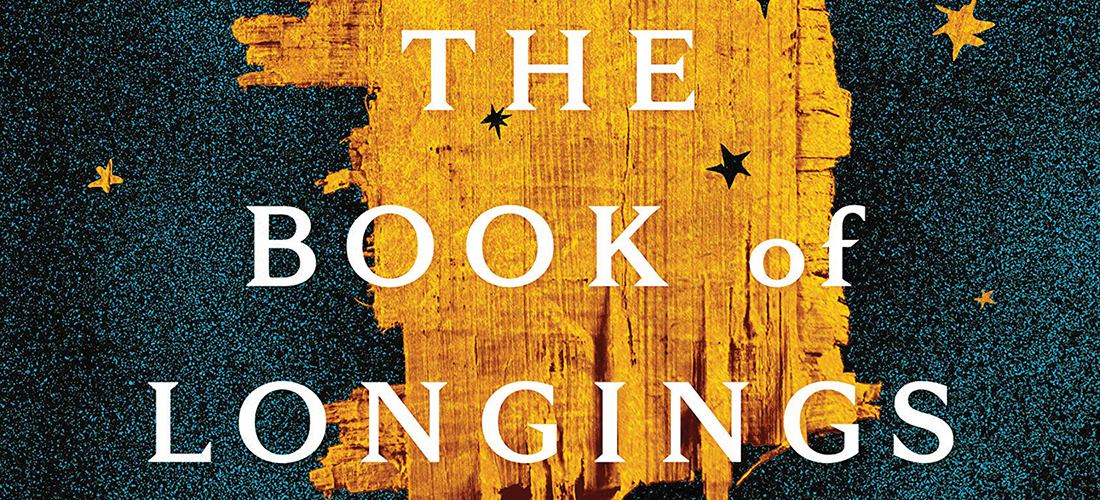
Portrait of “Little Thunder”
Sue Monk Kidd imagines the wife of Jesus
By D.G. Martin
“It could have happened.”
My friend was talking about The Book of Longings, the latest novel from Sue Monk Kidd, the bestselling author of The Secret Life of Bees that sold over 8 million copies and appeared on The New York Times bestseller list for 2 1/2 years.
The central character and narrator of Kidd’s new book is Ana, who opens the story with the following, “I am Ana. I was the wife of Jesus ben Joseph of Nazareth. I called him Beloved and he, laughing, called me Little Thunder.”
It could have happened, just as my friend asserted, but it is a stretch to believe Jesus was married. No, it would be many stretches, and Kidd, the expert storyteller, uses each one to build a rich, complex, and almost believable tale of a woman who became Jesus’ wife.
Although the book is set in the Middle East of 2,000 years ago, the coming together of Jesus and Ana was framed in North Carolina, where Kidd wrote her book. That came as a complete surprise to me. I knew Kidd had deep roots in Sylvester, the town in Georgia where she grew up. Until I learned about her new book, I did not know that she and her husband moved to Chapel Hill a couple of years ago, a place they chose, never having seen, after reading articles about best places to live in America.
Her move to our state solidifies North Carolina’s claim to be a home and refuge for the nation’s best writers.
The book’s story begins in the year 16 A.D. Ana is the teenage daughter of the head scribe of Herod Antipas, son of Herod the Great, and, subject to the Roman overlords, the ruler of Galilee. We know this Herod Antipas as the King Herod from the Bible’s account of his ordering the execution of John the Baptist.
Ana and her mother, father, aunt and servants live near Antipas’ palace in Sepphoris, a thriving city. Ana’s cousin and adopted brother, Judas, has left home to join with Zealots fighting against the Roman occupation. Near Sepphoris is the poor village of Nazareth, where Jesus lives in a less-than-modest hovel with his widowed mother, Mary, and his siblings.
Unlike most other young women of the times, Ana is well-educated and writes stories of women heroes of the Bible. Although she cherishes her unmarried status, her parents arrange for her betrothal to an elderly, unattractive but wealthy man. She is distraught. When he dies before the wedding, she is relieved. Then her parents push her to become Antipas’ concubine, a position that would provide security for her and her parents.
Meanwhile, she has encountered the young Jesus, who walks each day from Nazareth to Sepphoris to work on a massive construction project for Antipas. The spark is immediate. She appreciates his deep connection to God, or as Jesus calls him when he prays, Abba or Father. He appreciates her education and aspirations to write and promote the place of women.
Their marriage transforms her privileged life into hand-to-mouth poverty in the crowded house in Nazareth, where Ana does not get the warmest of welcomes from Jesus’ brothers and their spouses.
Kidd describes the smells and the constant chores of cooking, milking, feeding, sewing, petty jealousies and resentments that fill the lives of the struggling poor family. Jesus is often gone for long periods to work on projects in other parts of Galilee, sometimes even going as far as the Sea of Galilee to work with fishermen.
Jesus’ search for God leads him to the preaching of John the Baptist. He becomes a follower, and when John is arrested by Antipas, Jesus becomes a leader, leaving Ana alone with his family in Nazareth.
When Ana offends Antipas, she becomes another of his targets. For safety, Ana’s aunt takes her to the great library city of Alexandria in Egypt, where she encounters another set of conflicts and challenges.
Ana waits and waits for a message from Jesus telling her to return. The message finally comes in the form of a letter from Judas, who urges her to hurry. She arrives in Bethany near Jerusalem just in time for a Passover dinner with Mary, Martha, Lazarus and Jesus, but Jesus is not there. He is on trial in Jerusalem. The next day Ana hurries to Jerusalem just in time to watch as Jesus carries the cross toward the execution site. He collapses. Ana rushes to comfort him and say goodbye.
Kidd reconstructs the crucifixion experience in a way more horrible and poignant than any of the four Gospels.
She also offers a surprising explanation of why Judas betrayed Jesus. Many deeply faithful religious people have never understood Judas’ motivation. Was it simply for the 30 pieces of silver? In Kidd’s version, it is not for the coins, but rather his belief that Jesus’ death at the hands of the Romans would ignite a rebellion against those occupiers, a goal Judas and his fellow Zealots shared, but Jesus rejected, working instead to prepare for the coming Kingdom of God.
“One of the biggest questions in the Christian crucifixion story is why Judas betrayed Jesus,” Kidd says. “I wanted to give him a motivation for his betrayal, to humanize him, too, and cause our thoughts about him to be less black-and-white and more complex. In my imagined version, Judas is Ana’s adopted brother who was orphaned when his father was crucified and his mother sold into slavery after a failed Jewish revolt against the Romans, a historically real insurrection by the Jews of Sepphoris in 4 BCE. I portray Judas as a child consumed with hatred for Rome, as a radical Zealot, and as an ardent disciple who believes Jesus is the Messiah destined to deliver them from Rome. His betrayal of Jesus is a piece of intricate and earnest political theater. It speaks, I think, to the danger of hyper-idealism, how a person overly possessed by a principle can begin to justify almost anything for his cause.”
That Ana’s story continues after Jesus’ death emphasizes Kidd’s and Ana’s belief that excluding and minimizing the role of women in the days of Jesus and today has been a tragic mistake.
For many years, Kidd has been interested in feminist theology and has written “about silenced and marginalized women and the missing feminine within religion. I can only speculate that the premise for the novel bloomed out of that exploration.”
Whether Kidd’s readers are true believers or skeptical inquirers, whether they are strong supporters of an expanded role for women in religious organizations or resisters of change, The Book of Longings will be an enriching and challenging read. OH
D.G. Martin hosts North Carolina Bookwatch Sunday at 3:30 p.m. and Tuesday at 5 p.m. on UNC-TV.





